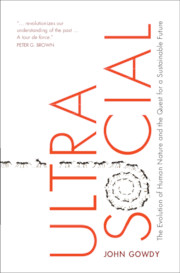Book contents
- Ultrasocial
- Reviews
- Ultrasocial
- Copyright page
- Dedication
- Contents
- Figures
- Tables
- Preface
- Acknowledgments
- Part I The Evolution of Human Ultrasociality
- 1 The Ultrasocial Origin of Our Existential Crisis
- 2 The Evolution of Ultrasociality in Humans and Social Insects
- 3 Our Hunter-Gatherer Heritage and the Evolution of Human Nature
- 4 The Agricultural Transition and How It Changed Our Species
- Part II The Rise and Consolidation of State/Market Societies
- Part III Back to the Future
- Notes
- References
- Index
3 - Our Hunter-Gatherer Heritage and the Evolution of Human Nature
from Part I - The Evolution of Human Ultrasociality
Published online by Cambridge University Press: 09 October 2021
- Ultrasocial
- Reviews
- Ultrasocial
- Copyright page
- Dedication
- Contents
- Figures
- Tables
- Preface
- Acknowledgments
- Part I The Evolution of Human Ultrasociality
- 1 The Ultrasocial Origin of Our Existential Crisis
- 2 The Evolution of Ultrasociality in Humans and Social Insects
- 3 Our Hunter-Gatherer Heritage and the Evolution of Human Nature
- 4 The Agricultural Transition and How It Changed Our Species
- Part II The Rise and Consolidation of State/Market Societies
- Part III Back to the Future
- Notes
- References
- Index
Summary
For most of human history, some 300,000 years, we lived in immediate-return hunter-gatherer societies that were egalitarian and sustainable. Hunter-gatherers lived using direct flows of plants, animals, and materials from nature. This required institutions and belief systems that reinforced sustainable resource use. The social cohesion and egalitarianism of small-scale, face-to-face societies also required institutions and customs that promoted harmony and protection for all members. New evidence about hunter-gatherers contradicts the widely held belief that today’s pervasive inequality and the decimation of the nonhuman world are due to “human nature.” Two prevalent beliefs reinforce the “defective human nature” view: the idea of Pleistocene overkill and the belief that hierarchy and inequality characterized early human societies. Both ideas are examined and debunked in this chapter. This chapter also stresses the importance of diversity, serendipity, and synergy in human physical and social evolution.
- Type
- Chapter
- Information
- UltrasocialThe Evolution of Human Nature and the Quest for a Sustainable Future, pp. 41 - 63Publisher: Cambridge University PressPrint publication year: 2021

